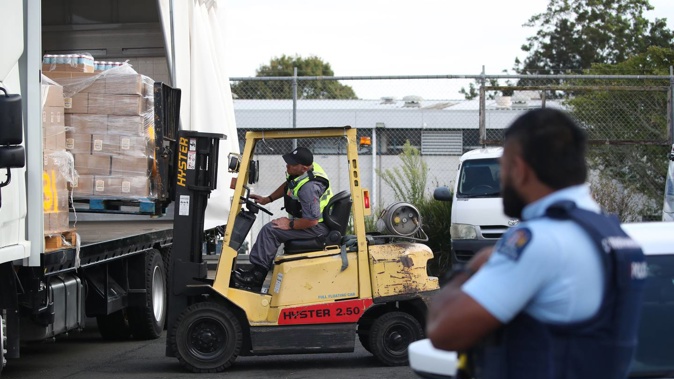
The Minister of Police has congratulated officers for making the biggest methamphetamine bust in New Zealand’s history - a three-quarter of a tonne haul inside a South Auckland warehouse.
Ginny Andersen said the 747kg bust in March, and revealed exclusively to the Herald yesterday, would deal a “significant financial blow to gangs and organised criminals”.
But while researchers and drug harm reduction groups acknowledged the record haul and the causes behind an increasing supply of drugs, they called for a shift of focus to reducing the demand for them.
The seizure followed a police investigation into the lacing of cans of beer with the Class A drug, which killed 24-year-old Aiden Sagala after he drank one earlier this year.
/cloudfront-ap-southeast-2.images.arcpublishing.com/nzme/OIMZXPICTJHDLKIUQ3KTY4N6LQ.jpg)
Aiden Sagala died after drinking beer laced with methamphetamine. Photos / Supplied
Massey Univeristy Associate Professor Chris Wilkins told the Herald meth seizures “are great and are having an impact, the real future is in demand reduction because it’s actually the best kind of policy”.
Drug Foundation chief executive Sarah Helm echoed Wilkins’ advocacy for curbing the amount of demand for meth in communities.
“While that supply [of meth] has grown, our community resilience hasn’t. We need much better preparedness for a change in our global drug supply,” Helm said.
“We have over-emphasized seizures, [which are a method] of supply control.”
/cloudfront-ap-southeast-2.images.arcpublishing.com/nzme/5LIPUMPJGVCY3E7ELPIMG2X7PY.jpg)
Ginny Anderson said the 747kg bust in March, and revealed exclusively to the Herald yesterday, would deal a “significant financial blow to gangs and organised criminals”. Photo / Supplied
Andersen said, “the best way to disrupt organised crime and the harm it causes is by resourcing the police and giving them the proper legislative tools to ensure they can effectively hold offenders to account.”
Andersen claimed the Government’s investment in police - a 50 per cent increase in funding and 1800 extra police officers - was making a “real difference”.
But Helm said “things that might actually help” included growing the intervention programme Te Ara Oranga and addressing unmet mental health needs.
“Reducing demand and reducing harm are the other parts of a good, healthy drug policy and we neglect those parts very regularly - at our own peril,” she said.
/cloudfront-ap-southeast-2.images.arcpublishing.com/nzme/YZXIK2LFZYA6S3MSPDG6XDGQ7I.jpg)
Dr Chris Wilkins, a drug policy researcher at Massey University. Photo / Doug Sherring, File
“If we want to reduce demand, we would invest in it and would do things to meet the health needs of people or the reasons why people are seeking out illicit substances in the first place,” Helm said.
Wilkins went further, saying supply reduction - busts - could drive the prices of drugs up by making them scarcer: “That attracts more people who want to supply the drugs because they get more money.”
He said we could “get people out of the market” for meth by lowering demand: “You know, drug treatment, drug prevention, and supporting people who want to get off methamphetamine.
“We tend to focus pretty exclusively on supply reduction and have neglected that demand and treatment approach - even real basic policies aimed at poverty and mental health disorders.
/cloudfront-ap-southeast-2.images.arcpublishing.com/nzme/LDOHLGYJIDCOJ5RJLIE4CU6XAI.jpg)
Drug Foundation chief executive Sarah Helm. Photo /Supplied
“Those things aren’t as sexy as supply reduction [busts], but ultimately they can reduce that demand.”
Wilkins said New Zealand’s changing gang landscape was one factor behind the increasing supply here, along with new sources for the Class A drug.
Wilkins said, “we used to talk about tens of kilos. You know, 50 or 60kg. Now we talk about the hundreds.”
The amount of meth found in March tops the previous record bust in January this year when 713kg was seized, found concealed in maple syrup at the border. Last year, 613kg was seized at Auckland Airport.
In 2016, 501kg of meth was found on Ninety Mile Beach and another 500kg was found in Whakatane in 2019. The next biggest meth busts were a 469kg haul in 2019, and a 448kg haul in 2016.
The biggest bust of any drug was 3.2 tonnes of cocaine found floating in the ocean this year. Last year, 700kg of cocaine was discovered at the Port of Tauranga.
Wilkins said there were countries where governments were supporting organised crime.
“And they’re producing methamphetamine by the factory.
“Basically, the level of production in these parts of the world has gone up considerably. There are new countries of supply. Mexico, the Middle East, even Canada.
“You’ve got gangs that are very focused on the methamphetamine trade as a profit-driven business. They’re just reacting to the price. You’ve also got the new 501 gangs, the deportees from Australia,” he said.
Raphael Franks is an Auckland-based reporter who covers breaking news. He joined the Herald as a Te Rito cadet in 2022.
Take your Radio, Podcasts and Music with you









